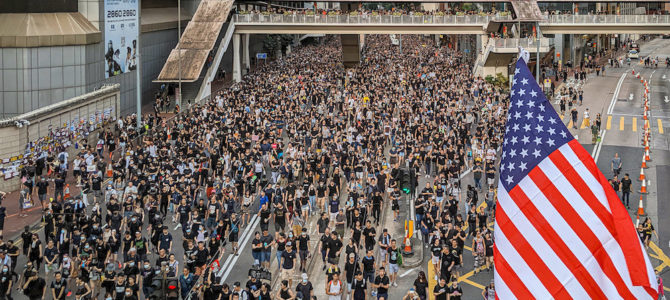
In the middle of the night on Sunday, pro-democracy protesters hauled a ten-foot statue known as “Lady Liberty” to a mountaintop overlooking Hong Kong as protesters clashed with riot police in the city below. The statue depicts an injured young woman in goggles and a helmet, holding an umbrella in one hand and a black flag in the other and proclaiming the protesters’ rallying cry, “Liberate Hong Kong, revolution of our times.”
The Hong Kong protesters are fighting for liberty, but they’re also fighting for their lives as Beijing tightens its grip on the city. Videos of riot police chasing and beating protesters in the streets—including one viral video of a “de-arrest” featuring a protester’s flying high-kick on a police officer—circulated Sunday on Twitter.
The high-kick video was shared via WhatsApp, a messaging platform owned by Facebook, one of the few U.S.-based companies willing to stand up to the Chinese government as tensions rise in Hong Kong. Last month, the social media giant shut down an attempt by Chinese officials to use “hotlines” on WhatsApp to track and monitor Hong Kong protesters.
Police had planned to use the hotlines to let members of the public post photos and videos of protest activity, allowing police to gather intelligence on the protesters. After suspending the hotlines, Facebook issued a statement saying “WhatsApp is primarily designed for private messaging and we take action to prevent bulk and automated messaging.”
https://twitter.com/HighlandPaddyHK/status/1183285399424126976?s=20
Twitter has also been willing to push back against the Chinese state’s attempts to use its platform to undermine the protests. In August, Twitter said it had discovered a “significant state-backed information operation” designed to discredit the legitimacy of the pro-democracy protesters and spread disinformation. The company suspended nearly 1,000 accounts it said were being used in a coordinated manner by Beijing. Around the same time, after news reports that China’s official state news agency was promoting tweets attacking the protesters, Twitter announced it would no longer accept advertising from state-controlled media organizations.
Twitter and Facebook are the exceptions to a disturbing trend of U.S.-based companies bowing and scraping before the Chinese Communist Party. Witness the recent spectacle of the NBA censoring fans on American soil and shutting down questions from reporters asking players for comment on Hong Kong. It wasn’t enough to apologize for Houston Rockets General Manager Daryl Morey’s tweet supporting the protesters. With billions invested in China, the NBA is apparently willing to import Beijing’s authoritarian methods to the United States.
Americans who love liberty—which is most of us, regardless of where we fall on the political spectrum—are appalled at this. The People’s Republic of China is an autocratic state under the pitiless rule of the Communist Party of China. It runs the world’s largest concentration-camp network, suppresses religious practice among Christians, Jews, and Muslims, runs a massive organ-harvesting operation among political prisoners and ethnic minorities, and is in the process of creating—with the help of U.S. technology firms—the largest surveillance state in human history.
Contrary to the idiotic blather of Golden State Warriors coach Steve Kerr, there is no moral equivalence between the United States and China, and almost every American knows it. Most Americans also know that there is no moral difference between the Hong Kong protesters’ struggle for liberty and our own American Revolution. Their cause is so obviously just, so quintessentially American, it has united political figures as disparate as Sen. Ted Cruz and Rep. Alexandria Ocasio-Cortez.
Time to Rethink Corporate Welfare
That’s why the behavior of these companies is so jarring. They clearly don’t share the allegiances or principles of the vast majority of the American people. They are concerned with other things, namely, making billions in China.
One might argue, so what? Companies, especially global companies, are supposed to make money, not play politics. Their only allegiance, as some libertarians like to point out, is to their shareholders.
Okay, fine. If these companies don’t owe allegiance to America and its founding principles, maybe it’s time to rethink what the American people owe them. If Delta airlines is going to affirm PRC territorial claims and adjust its corporate policies to appease the Chinese state, then maybe it shouldn’t receive tax subsidies from state governments and local economic development authorities.
Maybe the monopoly Delta enjoys at its regional hubs in Atlanta, Detroit, and Minneapolis should be up for negotiation. Maybe we should rethink the billions in federal subsidies that go to every major U.S. airline that kowtows to communist China.
Same goes for Apple, and Disney, and all the global firms that do the PRC’s bidding. If Apple’s Tim Cook, who a few years ago publicly defended his decision not to help the FBI’s investigation of a terrorist attack on U.S. soil, is going to pull apps Hong Kong protestors use to defy the state, maybe it’s time to stop giving Apple millions in sales tax subsidies every year.
In other words, if these companies don’t owe any allegiance to America, why should America owe allegiance to them? There’s more to the life of a nation than its commerce, and some things really are worth fighting for. The struggle for freedom in Hong Kong is one of them. If these companies can’t bring themselves to cast their lots openly with America and the Chinese people against the tyranny of the Chinese Communist Party, then we owe them nothing but contempt.









